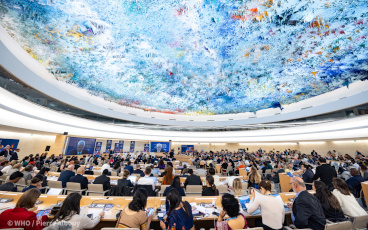Sanofi Pasteur donates vaccine strain used for polio eradication to WHO
Sanofi Pasteur has donated to the World Health Organization (WHO) a vaccine seed-strain used for the production of oral polio vaccine (OPV). The type 3 polio seed-strain is the original viral seed used to produce large quantities of OPV against type 3 poliovirus.

Since 1988, the Global Polio Eradication Initiative (GPEI) – spearheaded by WHO, Rotary International, the US Centers for Disease Control and Prevention (CDC) and UNICEF – has achieved a 99% reduction in the number of polio cases worldwide. This reduction has been achieved as a result of the large-scale administration of OPV. The generous donation by Sanofi Pasteur to WHO has significant implications, both for the global effort to eradicate polio, and also for the post-eradication era.
With this donation, WHO now ‘owns’ all three seed-strain viruses (type 1, 2 and 3) needed for the production of polio vaccines. While Sanofi Pasteur had in the past made available its type 3 seed-strain, in collaboration with WHO, to other manufacturers to help secure a global supply of polio vaccines, the generous donation at this time will further simplify this process, and is in fact a tribute to Albert Sabin’s – the developer of OPV – spirit to assure fair distribution of vaccines. It means that production capacity – including in the developing country setting – can be further scaled-up to help meet the needs of the GPEI, and further strengthen public health systems. WHO will continue to work with countries to ensure good manufacturing practices are adhered to, through its pre-qualification process. The strain will be physically reposited at the National Institute for Biological Standards and Control (NIBSC) in the United Kingdom.
“Continued vaccine innovation and consistent vaccine supply has been central to the sudden, renewed surge of progress that we’ve seen towards polio eradication over the last 24 months, bringing us closer than ever to completely wiping this disease from the earth,” said Dr Bruce Aylward, Assistant Director-General for Polio, Emergencies and Country Collaboration at WHO. “On behalf of the Global Polio Eradication Initiative, I would like to thank Sanofi Pasteur for its deep and continuing commitment to the global eradication effort as evidenced again by the generous donation of its type 3 polio seed-strain that is used in the production of OPV and is central to ensuring a consistent global supply of this vital tool for the global eradication effort.”
“Sanofi Pasteur is a leading contributor to the fight against polio,” said Olivier Charmeil, President and CEO of Sanofi Pasteur. “We have provided polio type 3 viral seeds free of charge to polio vaccine manufacturers worldwide for the last 30 years. This donation is a logical next step to our 30-year unconditional support to OPV producers and a demonstration of our continued commitment to public health.”
With progress towards global polio eradication being seen over the past 12 months, this donation also has important implications for the post-eradication era. Polio vaccines will need to be available, and their supply adequately managed, to assure outbreak response capacity should poliovirus re-emerge after eradication. Management of such vaccine stockpiles will now be significantly simplified as a result of this donation.
This is a further example of strong private sector collaboration within the GPEI, and part of broader ongoing work to ensure more affordable and more widely-distributed vaccines.













